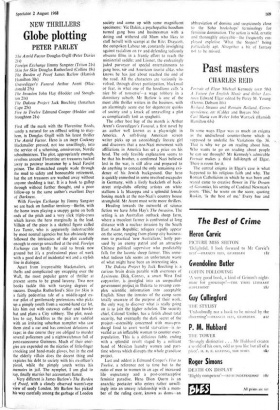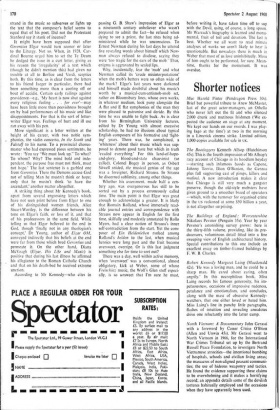Past masters
CHARLES REID
Portrait of Elgar Michael Kennedy (ouP 50s) A Future for English Music and Other Lec- tures Edward Elgar edited by Percy M. Young (Dennis Dobson 80s) Richard Strauss and Romain Rolland. Corre- spondence, etc (Calder and Boyars 50s) Carl Maria von Weber John Warrack (liamish Hamilton 63s) In some ways Elgar was as much an enigma as the undisclosed counter-theme which is supposed to underlie his Variations Op. 36. That is why we go on reading about him. Who wants to go on reading about people he can see through? Mr Kennedy's admirable Portrait makes a third full-length of Elgar. There is room for it.
The central enigma in Elgar's case is what happened to his religious faith and why. The Roman Catholicism in which he was born and reared came to creative flower in The Dream of Gerontius, his setting of Cardinal Newman's poem. 'This,' he wrote on the score, quoting Ruskin, 'is the best of me.' Every hue and strand in the music so subserves or lights up the text that the composer's belief seems to equal that of his poet. Did not the Protestant Stanford say it stank of incense?
It might have been supposed that after Gerontius Elgar would turn sooner or later to the Liturgy. Not so. When, in 1928, Car- dinal Bourne urged him to set the Te Deum he dodged the issue in a curt letter, giving as his reason the 'irregularity' of a text which (though he didn't mention this) had given no trouble at all to Berlioz and Verdi, sceptics both. By this time, as is clear from the letters to his friend Jaeger in particular, there had been something more than a cooling off or bout of accidie. Certain early railings against providence—e.g., 'My heart is now shut against every religious feeling . . . for ever'—may have been little more than peevishness brought on by bad performances of his music and like disappointments. For that is the sort of letter- writer Elgar was. Feelings of hurt and ill use ran away with his pen.
More significant is a letter written at the height of his career, with two noble sym- , phonies, the violin concerto, In the South and Falstaff to his name. To a provincial chorus- master who had expressed pious sentiments, he wrote: 'You say "We must look up." To what? To whom? Why? The mind bold and inde- pendent, the purpose free must not think, must not hope.' The last sentence is a garbled one from Gerontius. There the Demons accuse God not of telling Man he mustn't think or hope; only that he mustn't think 'to have the ascendant,' another matter altogether.
A striking thing about Mr Kennedy's book, apart from several engrossing letters which have not seen print before from Elgar to one of his distinguished women friends, Alice Stuart-Wortley, is the difference between his tone on Elgar's faith, or loss of it, and that of his predecessors in the same field. While telling us that Elgar believed to the end in God, though 'finally not in any theologian's concept,' Dr Young, author of Elgar OM, conveyed indirectly that his beliefs at the end were far from those which bred Gerontius and permeate it. On the other hand, Diana McVeagh (Elgar, His Life and Music) is positive that during his last illness he affirmed his allegiance to the Roman Catholic Church and that on his death-bed he received extreme unction.
According to Mr Kennedy—who cites in passing G. B. Shaw's impression of Elgar as a nineteenth century unbeliever who wasn't prepared to admit the fact—he refused when dying to see a priest, the last rites being ad- ministered while he was unconscious. To Ernest Newman during his last days he uttered five revealing words about himself which New- man always refused to disclose, saying they were 'too tragic for the ears of the mob.' Thus, enigma is aggravated by sealed lips.
Why, incidentally, fear the 'mob' and what Newman called its 'crude misinterpretations' when the mob's betters were so often wide of the mark? Elgar's last years were darkened and himself made doubtful about his music's worth by a musical-cum-antisnob-snob set, rather on Bloomsbury lines, whose own works, in whatever medium, look puny alongside the A flat and E flat symphonies of the man they were pleased to patronise and deride. By this time he was unable to fight back. As is clear from his Birmingham University lectures, edited by Dr Young with almost excessive scholarship, he had no illusions about typical English composers of his formative and 'fight- ing' years. There was, he complained, a `whiteness' about their music which was sup- posed to denote good taste but which in truth `evaded everything.' For this land-of-hope- and-glory, blood-and-state chauvinist (so called), Colonel Bogey in person, as Osbert Sitwell snided, the musical genius of the age was a foreigner, Richard Strauss. In Strauss he discerned sublimity, among other things.
Whether his assessment, made half a cen- tury ago, was overgenerous has still to be sorted out by a process erroneously called time. The main point is that Elgar was great enough to acknowledge a greater. It is likely that Romain Rolland, whose immensely read- able journal entries and correspondence with Strauss now appear in English for the first time, skilfully and modestly annotated by Rollo Myers, had a clear notion of Strauss's inner self-contradiction from the start. Yet the com- poser of Ein Heldenleben ranked among Rolland's helden to the last, when musical heroics were long past and the fruit become oversweet, overripe. Or is this last judgment something else for time to sort out?
There was a day, well within active memory, when `oversweet' was a conventional, almost obligatory, kick at Weber, some of whose Freischiitz music, the Wolf's Glen stuff especi- ally, is so unsweet that I'm sure he must, before writing it, have taken time off to sup with the Devil, using, of course, a long spoon. Mr Warrack's biography is learned and monu- mental, fruit of toil and devotion. The last is best. Whether we all want to read minute analyses of works we aren't likely to hear is questionable. But nowadays there is much in Weber that most of us love uninhibitedly. More of him ought to be performed, for sure. Mean- time, thanks for the monument. It was overdue.







































 Previous page
Previous page